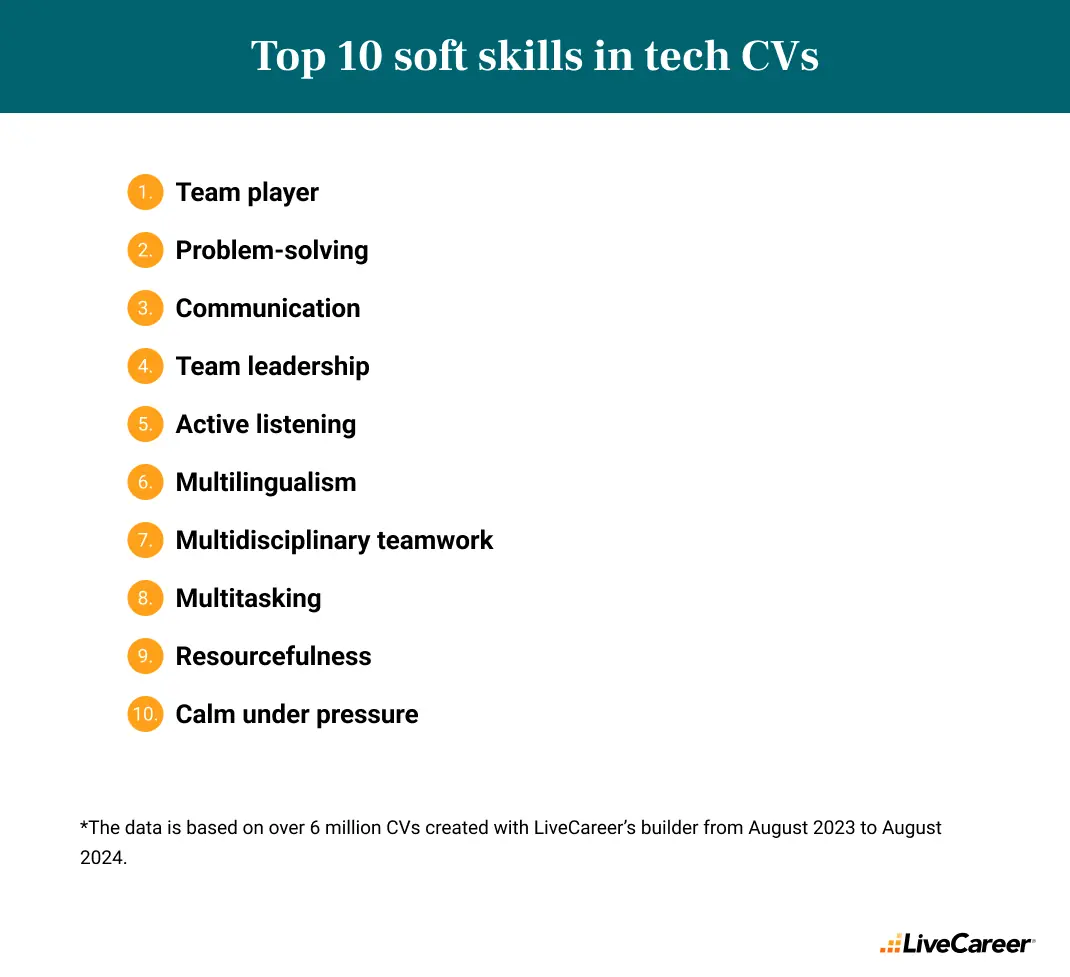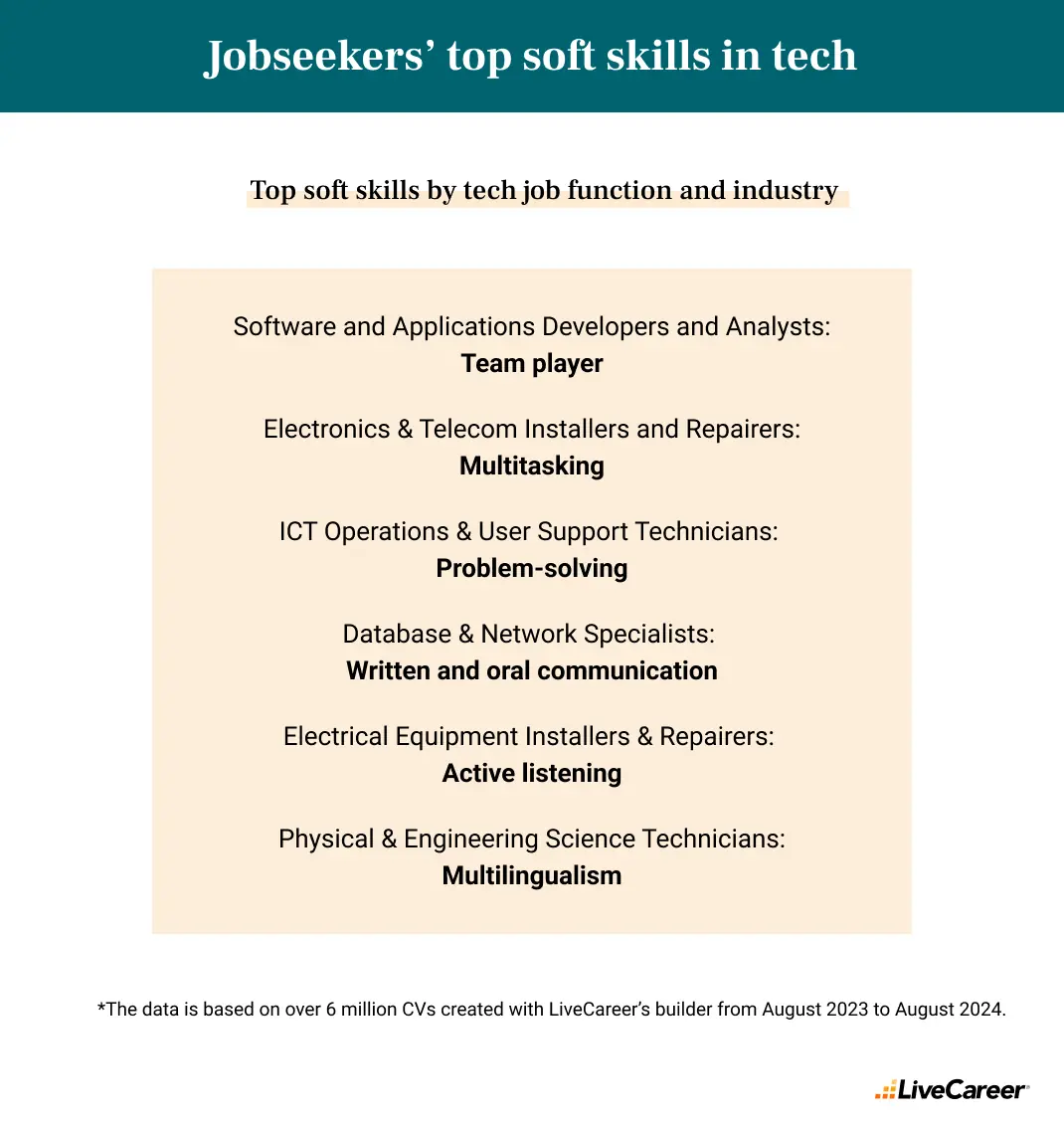
7 Soft Skills Employers Love in 2025 (+50 Examples for a CV)
Learn what are the soft skills and how to include them in your CV. Discover the most important soft skills examples that are most sought after by employers.
Our customers were hired by:
No one hires a tech specialist without core coding or data management skills. But in today’s job market, technical expertise alone isn’t enough. Soft skills have become as crucial as tech skills for long-term success in the industry.
Based on over 6 million CVs created with LiveCareer’s CV builder from August 2023 to August 2024, I’ve identified the top soft skills that tech professionals include in their applications to stand out to employers. In this article, you'll find these skills categorised by profession, so you can discover what to prioritise for specific tech roles.
Soft skills are the personal and interpersonal abilities that enable individuals to work with others and adapt to challenges. In the tech and IT sectors, these skills are key for fostering collaboration, driving innovation, and bridging the gap between technical expertise and human interaction.
Based on over 6 million CVs created with LiveCareer’s CV builder from August 2023 to August 2024, I’ve compiled a list of the top 10 soft skills most commonly highlighted in jobseekers’ applications.

It might seem unsurprising that being a team player ranks high, but its consistent importance underscores how vital collaboration remains in the tech world. The modern tech industry often involves agile teams, cross-departmental projects, and collaborative problem-solving. Employers value professionals who can seamlessly integrate with others, leveraging shared responsibility and trust to achieve results effectively.
While problem-solving is a fundamental skill, its prominence on this list highlights tech roles' high-pressure and innovation-driven nature. Finding innovative and practical solutions is essential to meet the industry's efficiency and creativity needs. This skill’s market relevance grows as businesses prioritise adaptability and quick, effective resolutions.
The emphasis on communication might seem surprising in such a technically focused field, but it highlights the increasing need for professionals who can bridge gaps between technical teams and non-technical stakeholders. Effective communication ensures alignment, reduces misunderstandings and enhances collaboration in a sector that thrives on precision and shared understanding.
The high ranking of team leadership reflects the tech industry’s recognition of the need for individuals who can balance technical expertise with people management. The demand for leaders who inspire, delegate effectively, and drive innovation showcases the importance of fostering not only technical solutions but also empowering teams to achieve collective success.
Active listening is less obvious but also noteworthy, as it underscores the importance of understanding diverse perspectives in a collaborative environment. In tech, this skill enables better integration of ideas across roles and disciplines, resulting in innovative and well-rounded solutions. It also aligns with the increasing focus on customer-centric approaches and interdisciplinary teamwork.
Multilingualism’s position here speaks to the globalised nature of today’s tech industry. With teams spread across continents and clients from diverse linguistic backgrounds, this skill enhances communication and collaboration. Its relevance is especially notable in roles involving localisation, technical support, or global product development, where language proficiency directly impacts project success.
The demand for multidisciplinary teamwork illustrates how vital it is to grasp the interplay of different skill sets and perspectives. In a field where developers collaborate with designers, marketers, and data scientists, this skill reflects the industry’s focus on creating holistic, user-centred solutions that meet both technical and business objectives.
Multitasking’s inclusion is a clear reflection of the fast-paced, high-demand nature of tech roles. Balancing overlapping priorities, from coding and debugging to responding to client feedback, is crucial for keeping projects on track. This skill’s prominence shows the value of maintaining quality while adapting to dynamic and often unpredictable workflows.
Resourcefulness stands out as a skill aligned with tech’s culture of innovation and efficiency. Its prominence highlights the industry’s appreciation for professionals who can creatively overcome constraints—be it limited resources, tight deadlines, or unexpected challenges—to deliver impactful results.
The value of remaining calm under pressure highlights the high-stakes environment of tech, where even minor disruptions can have major consequences. This skill resonates with market demands for professionals who can lead teams through crises, maintain focus, and ensure quality under stress. Its inclusion reflects a broader industry trend of prioritising resilience and composure in leadership and technical roles alike.
The UK's tech industry has experienced remarkable growth, solidifying its position as Europe's leading tech ecosystem, with a market valuation of $1.1 trillion as of early 2024.This expansion has led to a surge in demand for skilled professionals across various tech sectors.
Our analysts have also examined the data to highlight the essential soft skills for specific tech roles. Below, you'll find various tech niches and the most commonly mentioned soft skills in their applications.

For software developers and analysts, the following soft skills are particularly important:
Software developers and analysts also emphasise key skills like time management, resourcefulness, and motivating others. These abilities allow them to collaborate smoothly with cross-functional teams, manage complex projects, and deliver effective software solutions.
The O'Reilly 2024 Tech Trends Report points to a growing emphasis on soft skills among developers. Compared to previous years, the importance of project communication skills increased by 23%, professional development grew by 22%, and project management rose by 13%. This highlights the industry's recognition of the key role these soft skills play alongside technical expertise.
For professionals in electronics and telecommunications, these soft skills matter the most:
Electronics and telecommunications installers and repairers also often highlight skills like time management, quick learning, and confidence. These abilities help them to resolve technical issues efficiently and maintain excellent service delivery.
For ICT operations and support technicians, key soft skills include:
Additional soft skills highlighted by these professionals include resourcefulness, responsibility, and reliability, as well as self-discipline. These qualities enable technicians to provide excellent support while handling multiple user requests.
Database administrators and network professionals benefit from the following soft skills:
Database and network professionals also emphasise soft skills like team coordination, problem-solving, and quick learning. These competencies are vital to maintaining data integrity and security, fostering effective team communication, and driving successful project execution.
These are the top soft skills mentioned by electrical equipment installers in their applications:
Installers also highlight confident communication, self-assurance, and a positive attitude. Thanks to them, they work efficiently while strictly adhering to safety standards.
For technicians in physical and engineering sciences, essential soft skills include:
Technicians also mention team coordination, a positive attitude, and politeness and friendliness. These abilities contribute to smoother project execution, stronger relationships with colleagues and clients, and overall job satisfaction.
Are soft skills a new trend in the workplace? Definitely not. According to the World Economic Forum’s Future of Jobs Report, the top five core skills for 2023 were predominantly soft skills. Here are the 5 core skills indicated by surveyed organisations:
Based on the report, these are the 5 skills considered the most growing in importance:
According to the report, cognitive skills are increasingly important, highlighting the growing need for complex problem-solving in the workplace. Interestingly, creative thinking expands faster than analytical thinking, showing a strong demand for innovation. Technology literacy ranks as the third-fastest-growing core skill, underlining the ongoing demand for tech-savvy professionals in the digital field.
It is also worth mentioning that the shift toward developing soft skills is largely driven by emerging technologies like AI, which demand adaptability, problem-solving, and emotional intelligence. These are skills that AI cannot replace and are crucial for enabling effective collaboration with AI systems. According to the Global State of the Skills Economy Report 2024 by Cornerstone, human skills are in demand twice as much as digital skills globally, while in the UK, this ratio stands at 2.4 times.
The global soft skills training market is projected to reach $60.89 billion by 2031, with significant growth driven by UK demand. Companies increasingly invest in soft skills development programs to help employees adapt to today's dynamic workplaces. Consider these ways to develop soft skills in tech beyond formal training:
A report by McKinsey shows that employees with excellent soft skills earn much more and report higher job satisfaction.Moreover, these employees often experience greater job satisfaction, as they are more equipped to adapt to changing workplace demands and perform well in collaborative environments.
Employees with strong soft skills offer significant benefits to companies, too. According to McKinsey, organisations that prioritise emotional intelligence and teamwork experience a 25% increase in employee retention. These findings demonstrate that both employees and companies greatly benefit from investing in soft skills development, making it one of the key drivers of success in today's tech field.
Our editorial team has reviewed this article for compliance with Livecareer’s editorial guidelines. It’s to ensure that our expert advice and recommendations are consistent across all our career guides and align with current CV and cover letter writing standards and trends. We’re trusted by over 10 million job seekers, supporting them on their way to finding their dream job. Each article is preceded by research and scrutiny to ensure our content responds to current market trends and demand.
About the author
Patrycja is a career expert who specialises in helping you create compelling CVs and cover letters. With over 10 years of experience in content creation processes, she brings her expertise to the forefront of the industry.
Rate this article:
Soft skills in tech
Average:


Learn what are the soft skills and how to include them in your CV. Discover the most important soft skills examples that are most sought after by employers.

See 40+ IT skills examples for a CV and learn how to include them for maximum impact. Read this guide for training tips on improving your IT skills.

Unlock the power of your CV with our curated technical skills examples accompanied by expert advice. Elevate your CV and show your technical prowess.
Our customers were hired by: